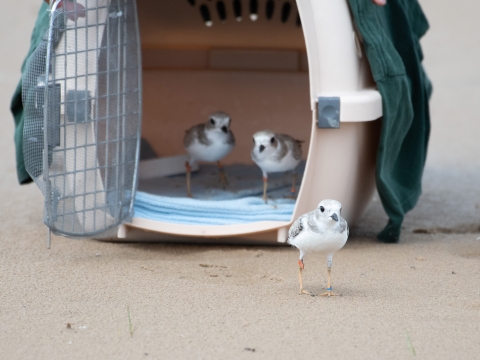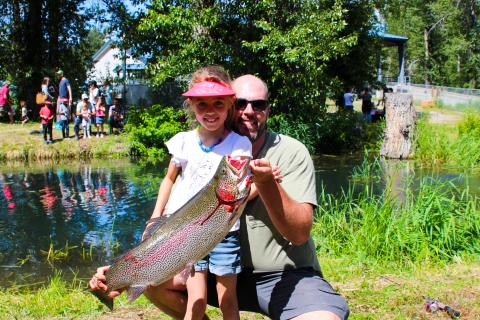Programs
Earth Day remains a day to honor our planet and build a healthy environment for future generations. We are providing helpful tips and information for you and for families. Then, head over to check out our fun, virtual and in-person activities.
The U.S. Fish and Wildlife Service is a bureau within the Department of the Interior. Our mission is to work with others to conserve, protect and enhance fish, wildlife and plants and their habitats for the continuing benefit of the American people. Our programs are among the oldest in the world dedicated to natural resource conservation.
Here is just a sampling of some our programs, efforts and partnerships taking action to build a healthy environment for future generations and how you can get involved.
Engage Communities. The Urban Wildlife Conservation Program prioritizes conservation and recreational access in urban areas where more than 80 percent of Americans live and can more directly benefit. We are addressing equity, the climate crisis and jobs through urban engagement.
Working with Tribes. Working together with Native American Liaisons and officials from among the federally recognized Tribes nationwide, the Office of the Native American Liaison identifies areas where both federal and Tribal conservation efforts can most effectively conserve fish, wildlife, plants and their habitats.
Visit a National Wildlife Refuge. With over 560 refuges throughout the nation, the National Wildlife Refuge Systemis the world’s leading network of lands and waters dedicated to wildlife conservation. The Refuge System also manages six wildlife-dependent recreational uses: Hunting, Fishing, Wildlife Observation, Photography, Environmental Education and Interpretation. Head over to the bird festival planner to find some great events that take place at or near national wildlife refuges.
Buy a Duck Stamp. When you buy a Federal Duck Stamp,you are doing your part to help ensure a bright future for wildlife, waterfowl and other migratory birds. For every dollar you spend on Federal Duck Stamps, 98 cents goes directly to purchase vital habitat for conservation purposes.
Support Junior Duck Stamp. Thousands of K-12th grade students from all over the United States compete for the “Best of Show” first place win in their state Junior Duck Stamp contests.
Education Programs. We offer a variety of education programs that connect families and people of all ages to the outdoors and provide enriching and resume building job opportunities for young people.
Visit a National Fish Hatchery. The 70 National Fish Hatcheries around the country work with states and tribes to produce and distribute fish for recreational and conservation purposes, and provide refuge for endangered species. They also offer outdoor opportunities from fishing events and tours to numerous education activities. Fishing is a great way to spend quality time outdoors with family and friends. Whether a first-timer or someone that has not fished in years, fishing is fun for everyone.
Celebrate Endangered Species Day. Observe Endangered Species Day, each year on the third Friday in May, and recognize the national conservation effort to protect our nation’s endangered species and their habitats.
Connecting People to Bird Conservation. World Migratory Bird Day celebrates and brings attention to one of the most important and spectacular events in the Americas — bird migration.
Plant a garden. Each year we celebrate National Pollinator Week, in recognition of the importance of pollinator species to agriculture, forest and grassland environments and other ecosystems.
Restore a wetland. Wetlands provide a multitude of ecological, economic and social benefits . They provide habitat for fish, wildlife and a variety of plants. May marks the annual observance of American Wetlands Month, a time to celebrate one of nature’s most productive ecosystems.
Prevent wildfires: More than 90% of wildfires in the United States are human-caused and preventable. Fire used wisely under the right conditions can help restore and enhance fish and wildlife habitat. We manage fire safely and cost-effectively to improve the condition of lands while reducing the risk of damaging wildfires to surrounding communities.
Consider a career in conservation. U.S. Fish and Wildlife employees are dedicated professionals working to conserve, recover and prevent the extinction of unique and imperiled species both locally and abroad.



